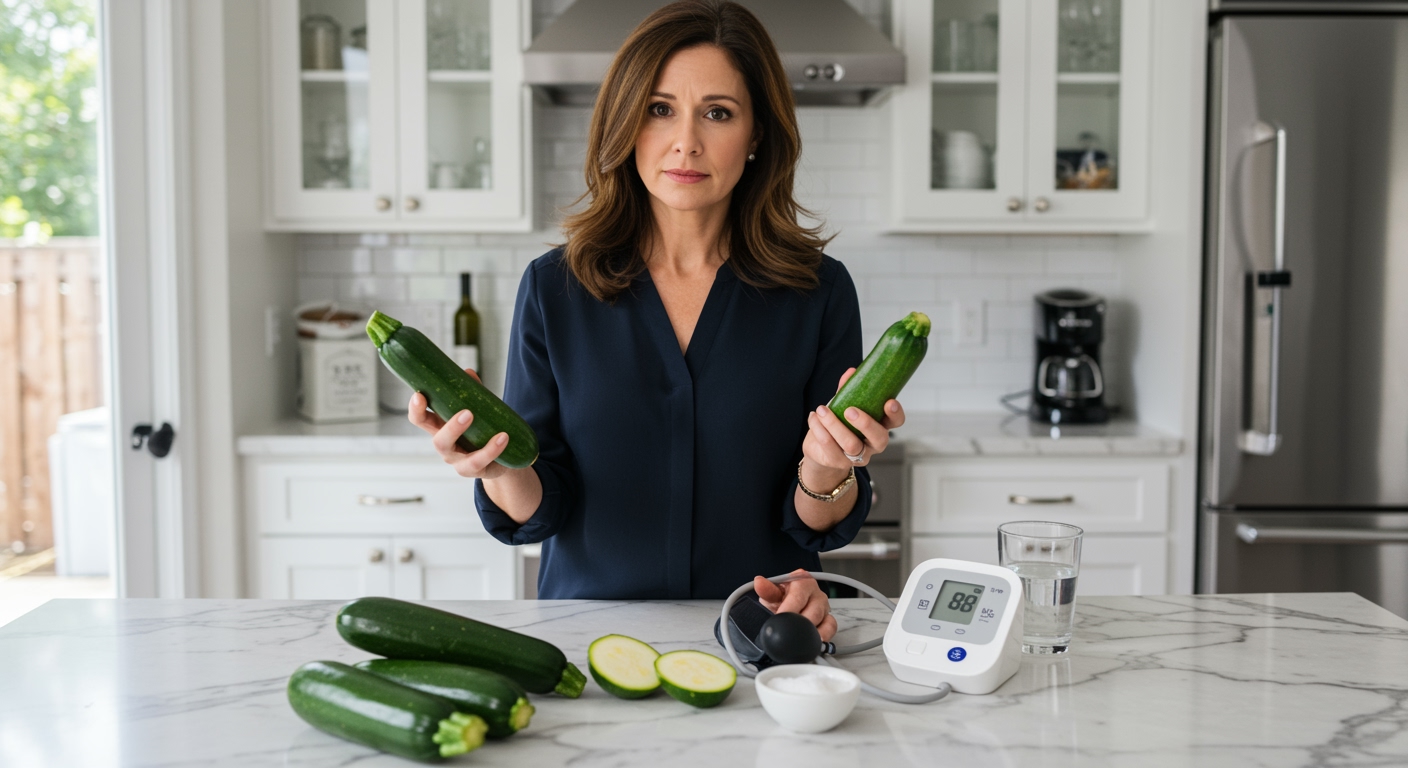✪ Key Takeaway: Zucchini contains potassium and water that may lower blood pressure slightly, but effects are minimal for most people.
Introduction
You grab a zucchini from your garden and wonder if this innocent vegetable could make your already low blood pressure drop even further.
Many people with hypotension worry about every food choice because they fear worsening their symptoms of dizziness, fatigue, and lightheadedness.
Hi, I am Abdur, your nutrition coach and today I am going to explain exactly how zucchini affects blood pressure and whether you should be concerned about including it in your diet.
What Makes Zucchini Different From Other Vegetables?
Zucchini belongs to the summer squash family and contains unique nutritional properties that set it apart from other vegetables.
This green vegetable consists of approximately 95 percent water, making it one of the most hydrating foods you can eat.
The high water content means zucchini provides minimal calories while delivering essential nutrients like potassium, magnesium, and vitamin C.
Unlike starchy vegetables such as potatoes or corn, zucchini contains very little natural sodium, which plays a crucial role in blood pressure regulation.
The vegetable also provides dietary fiber that supports digestive health and helps maintain stable blood sugar levels throughout the day.
✪ Fact: One cup of raw zucchini contains only 20 calories but provides 295 milligrams of potassium.
How Does Potassium In Zucchini Affect Blood Pressure?
Potassium acts as a natural vasodilator in your body, meaning it helps relax the walls of your blood vessels.
When blood vessels relax, they become wider and allow blood to flow more easily, which typically results in lower blood pressure readings.
Your kidneys use potassium to help eliminate excess sodium from your body through urine, creating a balancing effect on fluid retention.
However, the amount of potassium in zucchini is relatively modest compared to foods like bananas, spinach, or avocados.
Most healthy adults need about 3,500 milligrams of potassium daily, and one medium zucchini provides only about 8 percent of this requirement.
This means the blood pressure lowering effect from zucchini alone would be minimal for most people, including those with existing hypotension.
✪ Pro Tip: Monitor your blood pressure for a few days after eating zucchini to see how your body responds individually.
Can The High Water Content In Zucchini Cause Problems?
The high water content in zucchini could theoretically contribute to blood volume changes that affect blood pressure.
When you consume foods with high water content, your body temporarily increases blood volume as it processes the additional fluid.
However, your kidneys quickly adjust by filtering out excess water, so this effect is usually short-lived and minimal.
People with severe hypotension might notice slight changes in how they feel after eating large amounts of water-rich foods like zucchini.
The key factor is portion size – eating one or two servings of zucchini is unlikely to cause noticeable blood pressure changes in most people.
Your body maintains homeostasis through complex mechanisms that prevent dramatic blood pressure swings from normal food consumption.
✪ Note: Drinking excessive water while eating high-water foods might temporarily affect blood pressure in sensitive individuals.
Should People With Low Blood Pressure Avoid Zucchini?
Most people with low blood pressure do not need to avoid zucchini or worry about its effects on their condition.
The nutritional benefits of zucchini, including vitamins, minerals, and fiber, typically outweigh any minimal blood pressure effects.
Instead of avoiding zucchini, focus on proven strategies for managing low blood pressure such as increasing salt intake moderately and staying well-hydrated.
You can safely include zucchini in your diet while being mindful of portion sizes and how your body responds to different foods.
If you experience unusual symptoms after eating zucchini, such as increased dizziness or fatigue, consider reducing your serving size rather than eliminating it completely.
The most important factor for managing low blood pressure is maintaining a balanced diet that includes adequate sodium, protein, and complex carbohydrates.
✪ Pro Tip: Pair zucchini with naturally salty foods like cheese or olives to help maintain blood pressure stability.
What Are The Best Ways To Prepare Zucchini For Low Blood Pressure?
Cooking methods can influence how zucchini affects your blood pressure and overall nutritional absorption.
Sautéing zucchini with a small amount of sea salt can help counteract any potential blood pressure lowering effects.
Grilling or roasting zucchini concentrates its flavors while reducing water content, which may make it more suitable for people with hypotension.
Adding zucchini to soups or stews with broth-based liquids provides additional sodium that supports healthy blood pressure levels.
Avoid eating large amounts of raw zucchini on an empty stomach, as this maximizes the water intake effect that might temporarily affect sensitive individuals.
Consider combining zucchini with protein sources like chicken, fish, or eggs to create more balanced meals that support stable blood pressure.
✪ Fact: Cooking zucchini breaks down cell walls, making nutrients more bioavailable while reducing water content.
The Bottom Line
Zucchini is unlikely to significantly worsen low blood pressure symptoms in most people due to its modest potassium content and the body’s natural regulatory mechanisms.
The fear of food should never overshadow the benefits of eating a varied, nutritious diet – and this principle applies perfectly to zucchini and low blood pressure concerns.
I would love to hear about your experiences with zucchini and blood pressure, so please share your thoughts, questions, or personal observations in the comments section below.
References
At NutritionCrown, we use quality and credible sources to ensure our content is accurate and trustworthy. Below are the sources referenced in creating this article:
- Healthline: Zucchini Benefits
- WebMD: Health Benefits Zucchini
- Medical News Today: Zucchini Benefits





